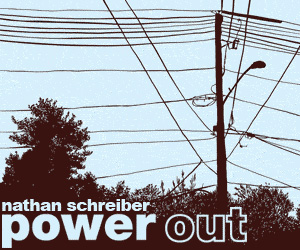
Power Out is a webcomic written and illustrated by comic creator Nathan Shreiber. Recently nominated for the prestigious Will Eisner Comic Industry Award in the Best Digital Comic category, Power Out tells the story of a young, socially awkward boy named Justin, his sister Carolyn, and the massive power outage that takes place the weekend that Justin and Carolyn’s parents are away on a cruise.
Although not as colorful as traditional comic books, Power Out has a unique visual style that sets it apart from many other webcomic series and allows readers to focus on the content of the story rather than just the visual images presented. Home alone while their parents are on vacation, Justin finds solace in video games and Internet porn while his sister, Carolyn, parties with a rather unsavory group of individuals. Interestingly, Power Out‘s focus on the physical results of the East Coast power outage serve as a window through which readers can view Justin and Carolyn’s emotional and intellectual self-empowerment — a strong comment on the state of society and our utter dependence on technology and, ultimately, electricity.
As the winner of the 2009 Xeric award, Nathan received a grant that allowed him to collect the first two chapters of Power Out in a printed anthology now available online through the Power Out web site. Power Out is still available to read online, of course, thanks to Act-i-vate, a webcomix collective that hosts Nathan’s comic series along with hundreds of other web-based comics. As if that weren’t enough, the Power Out web site also features a recently-released trailer for the webcomic series.
In the midst of all this excitement, I had the opportunity to speak with Nathan about his comic, his recent Eisner nomination, webcomics as an entertainment medium, and much, much more. For more information on Nathan Schreiber and Power Out be sure to follow Nathan on Twitter (@nathanschreiber) and check out the comic’s Facebook page. Without further ado, here is my interview with Nathan Schreiber.
 Paige MacGregor: First of all, let me congratulate you on your recent Will Eisner Comic Industry Award nomination for your webcomic Power Out. How did you find out about the nomination for Best Digital Comic? How did it feel when you heard the news?
Paige MacGregor: First of all, let me congratulate you on your recent Will Eisner Comic Industry Award nomination for your webcomic Power Out. How did you find out about the nomination for Best Digital Comic? How did it feel when you heard the news?
Nathan Schreiber: Jackie Estrada emailed me to make sure Power Out wasn’t in print before it was a webcomic (I recently collected the first 80 pages into a book I published with a Xeric grant), and then she told me I was nominated. I was completely overwhelmed; I still feel that way. You go through a lot of emotions, you’re excited and proud obviously, but there’s this weird feeling when you’re working on something for a long time and you think “I just need to keep working on this and a great opportunity will eventually come along.” But then when that opportunity comes you can’t help but feel like, “Oh god, I don’t wanna screw this up!” In short, it’s very humbling.
PM: Can you tell our readers a little bit about how you first became involved in creating webcomics? Did you always dream of working in the comic industry?
NS: Ever since I could buy comics with my paper route money, I always dreamt of making them professionally. But there was a time when I didn’t think that was very practical and became very academic. I went to college and studied economics and computer science, but I couldn’t keep myself from making comics. I started a webcomic in 2000 called Terrell Quimby, a semi-autobiographical strip about my dating life, which was pretty hilarious source material at the time. The work is completely unrecognizable from my stuff now — it took a long time for me to settle in to a style, but I think that’s typical for a lot of artists. I got in a groove with Power Out after I met a lot of the guys at Act-I-Vate.com and it’s been updating on that site (along with tons of other amazing webcomics) for the last year and a half.
PM: In your opinion, what value do webcomics hold for readers and comic creators as opposed to traditional, printed comic series?
NS: The best thing about webcomics is the low barrier to entry. You can self-publish your work — in color, no less — and get it out to people all around the world, and it barely costs anything! And from the reader’s perspective, you can get work from a lot more different sources and perspectives.
PM: How would you describe Power Out to a reader unfamiliar with your work? Can you discuss for our readers how you came up with the idea for the story?
NS: Justin is an anti-social fourteen-year-old knee deep in his awkward phase. And suddenly there’s this phenomena and every crutch in his life — his domineering mother, his loving but careless sister, the video games and computers he depends on to escape reality — disappears. And for the first time Justin has to find his own power, his own way of interacting with a world he’s always tried to ignore. It has a dream-like tone, as reality bends frequently.
The idea had been kicking in my head for a while. I was supposed to go to New York City in August 2003, and ended up canceling at the last minute and managed to avoid the blackout. So I was always fascinated by it, and when I moved to Brooklyn a year later I heard some very interesting stories — it seemed like a lot of people really enjoyed it, or found it refreshing. And I just find adolescence, particularly early adolescence fascinating — everything is changing — so that seemed like a natural fit for a protagonist.
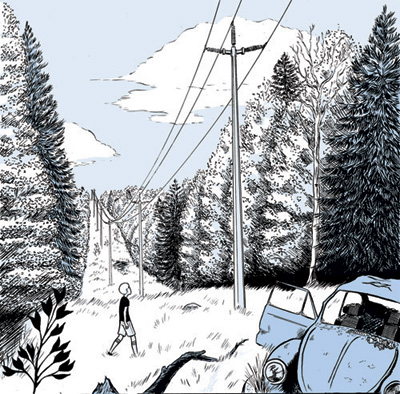
PM: What would you say is the message behind Power Out, if there is one?
NS: A central theme is the world — which I would say is both the physical world and the emotional world of our social bonds — is a terrifying and exhilarating place. A lot of times it’s too much to handle, and we have an instinct to escape from it, or water it down so it’s palatable. Power Out explores the gains and losses from both engagement and withdrawal from reality. I really hope that doesn’t sound too pretentious!
PM: Can you describe, briefly, the process by which Power Out is created — from your initial ideas all the way to uploading the comic onto the web (or however it ends up online for your readers)?
NS: First there’s writing, which is either the fastest or slowest part. I write one sentence for each panel, and then just draw where the boxes go on the page — how many go on what page, what size where, etc. Then I make thumbnails (little drawings) and if I’m really smart I’ll ink them, too — it’s a great way to figure out where the blacks are going on the page and keeps me from making mistakes later. I write and thumbnail my book a chapter at a time (there’s a loose outline for the whole story — I know how it ends), but then I work on individual pages in 3-5 page chunks. I blow my thumbnails up to 10″ x 15″ and put it on a lightbox and trace the breakdowns. Then I pencil — the figures I do pretty tightly but the backgrounds are loose. If there’s dialogue, I letter, but there’s rarely much text. Then I ink — most everything with a brush, but I also use pens, markers, whatever I can find. I ink figures first and then backgrounds — some of those forest scenes take a long time! After scanning, I apply the two shades of blue in Photoshop, and fix any mistakes. And then it’s posting, and going to every online channel I can find and screaming, “LOOK AT ME LOOK AT ME I MADE SOME NEW PAGES PLEASE LOOK!!” I hope I don’t annoy people.
PM: Can you discuss a bit some of the stylistic choices you made for Power Out — for example, why the comic has the type of color scheme it does? Was anyone else involved in these decisions?
NS: A central theme for Power Out is “the world is big.” Frequently the characters are drawn small surrounded by a huge environment. Blue — which is a receding color — expands the space and makes it even bigger. And it’s a “cool” story (and I mean cool like a cool breeze not like Fonzie is so COOL) — and I think the blue really helps achieve that quiet-but-epic tone.
PM: Can you talk about the function of the language barrier that exists between your characters and why you chose to include that in Power Out?
NS: I thought it was an interesting barrier to explore in comics — you have all these storytelling tricks to communicate the message without being explicit. I made a conscious decision to reveal what Maya is saying when the characters are oblivious to each other but to remove that translation when they are genuinely trying to communicate — it makes the reader identify with the character’s experience. Also, Justin has so many problems communicating that it feels appropriate.
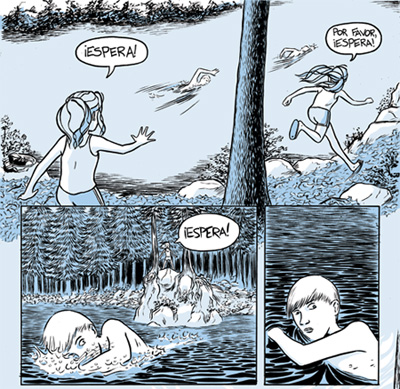
PM: What do you enjoy most about working on a webcomic series? Why?
NS: As soon as you’re done with a page, you can share it with others — that’s pretty great. I love getting comments on my pages, and heck, it’s even great when people can correct my typos.
PM: If you can discuss it at all, what can readers expect from Power Out in the near future?
NS: We’re about to enter the third act, so things will get more desperate and more intense. And weirder. I like to think of Power Out as a loose, abstract re-telling of Hansel and Gretel — there’s a brother and sister, no parents, a forest, an old witch — and towards the end you get to see the gingerbread house.
PM: Just for fun — if you had limitless resources to work on any project that you wanted, what would it be and how would you go about doing that? Why? Would your dream project be a webcomic or do you think you would choose to branch out into another creative area?
NS: If I had plane tickets, hotel rooms, a great translator, and a fixer or two, I’d love to go to Port-au-Prince and record stories about the events surrounding the earthquake and turn them into comics. I’m certain there are hundreds of tragic and inspiring stories that have never been heard. It’d be great to put it on the web — it would guarantee the most readers.
PM: If you could tell your readers and fans one thing — something that you wanted them to know about yourself or your work — what would it be?
NS: “Thank you!” The biggest reason I’m making these stories is so people read them, and it consistently blows my mind when they do. I’m incredibly grateful to have people following my work.
PM: What advice, if any, would you give to aspiring comic writers and illustrators or other individuals interested in comic or webcomic work?
NS: Most good advice is usually stuff everyone knows already but is very difficult to stick to. Work like hell. Plan ahead. Consider your audience, but make sure you enjoy your own story. Learn from everyone.
I would tell people to look for influences outside of their own medium. For instance, if you make comics, don’t look too hard at other comics for inspiration or your work will be derivative. Look at books, films, journalism, paintings, hell, even video games from different genres and cultures and try to understand what works. It’s not easy, but you can look at anything from the right angle and see something inspiring.


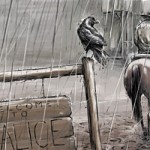
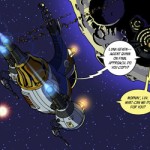
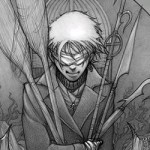
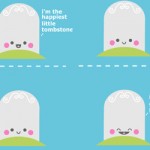
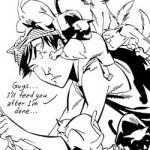
Love it!